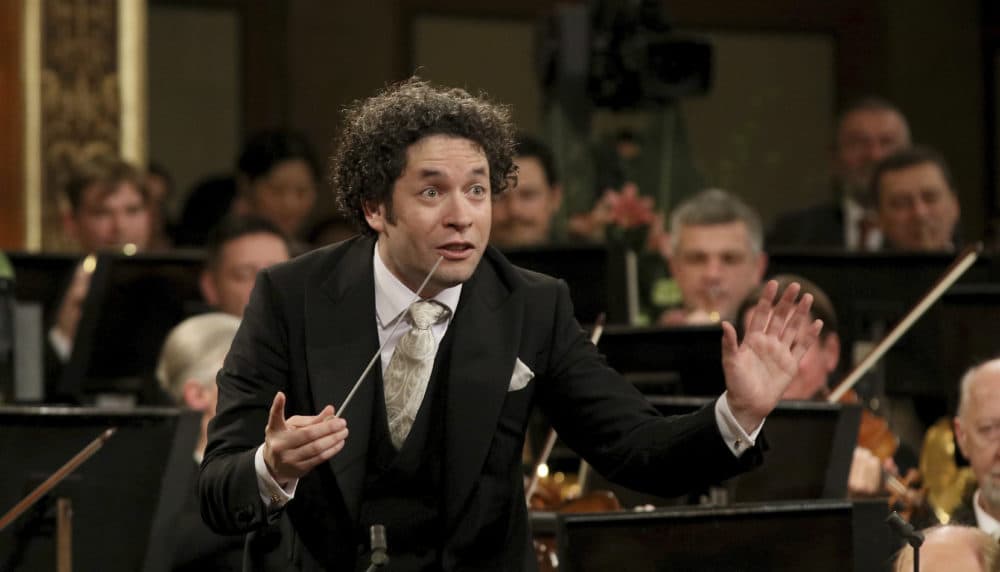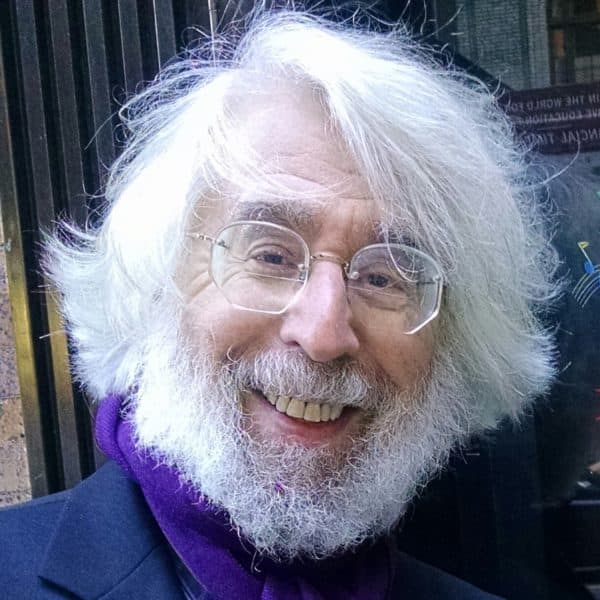Advertisement
Once More With Feeling: Dudamel Returns With The LA Phil For 'Rite Of Spring'

Many music lovers consider Stravinsky’s “The Rite of Spring” (“Le Sacre du Printemps”), subtitled “Scenes from Pagan Russia,” the greatest orchestral composition of the 20th century. Or at least the most revolutionary. Its thrilling changes in rhythm and tonality, its breathtaking, inexorable conclusion, and its passages of ravishing beauty make it a potential showpiece for conductors and orchestras.
It was not always the case. Almost everyone knows the story about its notorious premiere. It was composed as ballet music to be choreographed by the great Russian dancer Vaslav Nijinsky for Serge Diaghilev’s Ballets Russes. The premiere, on May 29, 1913, at the Théâtre des Champs-Élysées in Paris, caused a riot. It had its partisans, but many people found the choreography or the music, or both, a slap in the face to tradition and good breeding.
When I was a teenager, I owned the famous stereo LP with Pierre Monteux, who led the world premiere, and the Paris Conservatory Orchestra, with a reproduction of Henri Rousseau’s “The Snake Charmer” (a nude woman playing a flute in an exotic forest) on the cover. I played it as loud as I could to shock my parents, but my mother came into my room asking, “What’s that beautiful music you’re playing?”
And she was right. What shocked the first audience now exhilarates us, and it’s in the standard repertoire of every major orchestra, though the truly great performances remain rare. I heard a performance with Andrew Davis conducting the Toronto Symphony that completely fell apart and never found its way back. Seiji Ozawa got the Boston Symphony Orchestra to play the sacrificial ritual at the end very loud and very fast, but what led up to that outburst was tedious, and following in his footsteps, in 2014, Andris Nelsons led the BSO in a version one would have thought unimaginable it was so devoid of expression or meaning.
But last season, the BSO redeemed itself under the baton of Gustavo Dudamel, who last April was visiting from Los Angeles, where he is music and artistic director of the LA Philharmonic, his current position, following his meteoric rise from the Simon Bolívar Orchestra of Venezuela, the youth orchestra he grew up in. The 1929 recording with the BSO under Pierre Monteux is one of the gold standards for this piece, so it was gratifying to be reassured that in the right hands, the players could still pull off something spectacular.
This was a performance so shapely, that it held you mesmerized from its seductively sinuous opening bassoon solo to its final little flute ejaculation. Dudamel made as much sense of Stravinsky’s haunting slow music as of his percussive climaxes. The greatest live performance of “The Rite of Spring” I ever heard was Pierre Boulez conducting the London Symphony Orchestra at Carnegie Hall in 1995. Dudamel’s with the BSO was an impressively close second.
The BSO had scheduled four performances, with Stravinsky’s “Rite of Spring” balancing a program beginning with Schumann’s "Spring Symphony." I heard the second concert in the series and encouraged everyone I talked to who didn’t have tickets to go. But it was bad advice. The flare-up of a recent arm injury forced him to cancel his remaining two performances.
Now it makes me especially happy that the Celebrity Series of Boston is bringing Dudamel back to Boston this fall with the LA Phil, and that the major work on the program will be “The Rite of Spring.” I can’t wait to hear it again, and, once again, I encourage all the music lovers I know to get tickets (if any are left).
Here’s Dudamel in a gripping performance of the Stravinsky with the gifted young players of the Simon Bolívar Orchestra:
Just in case you’re not interested in Stravinsky, the rest of this program may have some appeal. Superstar pianist Yuja Wang, whose performance of the Schumann Piano Concerto with the BSO last February left me disappointed, was probably the wrong soloist for that virtuosic but poetic, oddly interior masterpiece. John Adams’ new piano concerto, his third, “Must the Devil Have All the Good Tunes?”, which he wrote for her on a commission from the LA Phil, is surely more up her alley. The world premiere was in Los Angeles last March, and Wang and the orchestra have since played it numerous times on an Asian tour.
Adams says the title suggests a “ ‘Totentanz,’ only not of the Lisztian manner, but more of a funk-invested American-style.” A reviewer in the Washington Post wrote:
During the concerto’s slow middle section — this is a single-movement work — the piano line treaded a cool, quiet path through a landscape of heavy-breathing basses and woodwinds murmuring the kinds of sinister melodies Bernard Herrmann might have used to underscore a Hitchcock heroine wandering into mortal peril. Wang’s phrasing here was clear, chaste and feather-light, proving yet again that she is as impressive for her poetic sensibilities as for her pyrotechnic dazzle.
Does this make me want to hear it? Take a guess!
The concert opens with a rare Boston performance of the Argentinian composer Alberto Ginastera’s mostly soulful and sometimes sparkling and energetic "Variaciones Concertantes" (1953), a theme with interludes and eight variations, each for different instruments.
The BSO has performed this work once before at Symphony Hall, back in 1988, and twice at Tanglewood. Good luck getting tickets.
The performance will take place at Symphony Hall on Saturday, Nov. 23, at the unusual time of 2 p.m.

